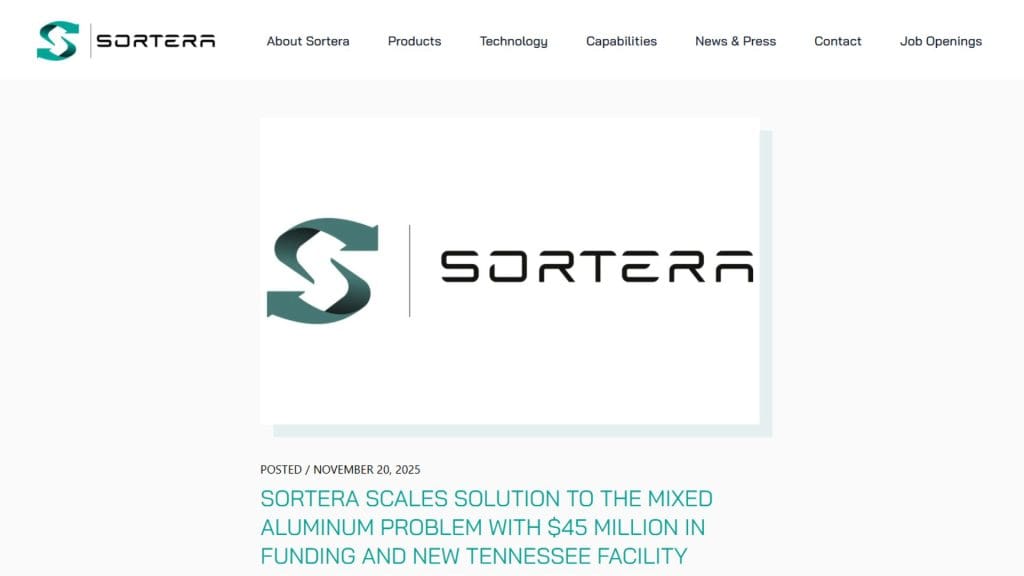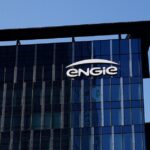Sortera Raises $45 Million to Scale AI Driven Aluminum Upcycling

• Sortera secures $45 million to expand its AI-enabled aluminum sorting platform and build a second U.S. facility in Tennessee.
• The company’s technology converts mixed end-of-life scrap into high-value alloys for automotive, aerospace, and construction supply chains.
• New capacity strengthens domestic circular metal production and reduces energy use by up to 95% compared with virgin aluminum.
Indiana to Tennessee: A Domestic Circular Metals Strategy Accelerates
Sortera Technologies, a U.S.-based leader in AI-powered aluminum upcycling, is moving into its next phase of expansion after closing $45 million in new funding and confirming plans for a second large-scale processing facility in Tennessee. The raise was led by accounts advised by T. Rowe Price Associates and VXI Capital, with participation from Yamaha Motor Ventures and Overlay Capital. Trinity Capital added dedicated financing for equipment procurement.
The investment comes at a moment when U.S. manufacturers face rising pressure to secure low-carbon materials and reduce exposure to foreign supply chains. Sortera’s model sits squarely within these priorities: transforming mixed aluminum scrap—long treated as low-value and frequently exported—into targeted alloys that can substitute for primary aluminum imports in high-spec industrial applications.
CEO Michael Siemer framed the market shift plainly. “The performance of our Markle facility and the enthusiastic response from our customers have made it clear: the domestic market is hungry for sustainable, high-quality recycled aluminum,” he said. “The robust investor confidence that powered this funding, coupled with the proven customer demand that necessitates our expansion into Tennessee, is a direct result of this success.”

AI-Enabled Sorting Unlocks New Material Streams
Sortera’s flagship facility in Markle, Indiana, began operations in early 2023 and has quickly become a demonstration site for what advanced sensors, AI-driven classification, and precise alloy blending can unlock from complex scrap streams. The company now produces end-of-life recycled alloys including 380, 356, 319, and 3105-series wrought products—chemistries traditionally sourced from primary aluminum producers.
The company’s platform sorts, identifies, and separates alloy fractions with a level of precision that allows downstream users to feed the material directly into automotive castings, aerospace components, and construction applications. In effect, materials historically downgraded or exported at a discount re-enter domestic value chains at high value.
Sortera pairs its multi-sensor sorting hardware with proprietary software and data analytics, giving customers verified alloy compositions and traceability. Executives in automotive and industrial manufacturing have increasingly sought transparent recycled content to comply with procurement requirements and internal decarbonization goals.
According to the company, using upcycled aluminum through its system reduces energy demand by as much as 95% relative to producing virgin metal. The emissions implications are significant: the process avoids the carbon intensity of primary smelting and keeps billions of pounds of end-of-life metal in domestic circulation.
Why the Tennessee Facility Matters for Supply Chains
The planned facility in Lebanon, Tennessee, will replicate the Markle operation while pushing Sortera’s production capacity toward roughly 240 million pounds annually. The location is strategic. Tennessee has become a hub for automotive and advanced manufacturing, and a second plant shortens transport routes for major buyers, lowers logistical costs, and reduces embedded emissions in the supply chain.
RELATED ARTICLE: Societe Generale, Citi, ING jointly tackle aluminum decarbonization
Siemer emphasized this proximity advantage. “This expansion allows us to significantly increase our capacity and establish a presence closer to many of our key customers—particularly in the automotive sector—further streamlining supply chains and enhancing our service capabilities.”
The new site is designed to tackle the full “mixed aluminum problem,” including cast, sheet, and extrusion upgrades. This positions the company as a major domestic supplier of certified recycled alloys at a time when U.S. and global regulators are tightening expectations for recycled content, lifecycle emissions, and traceability.
Implications for Investors, Policymakers, and Heavy Industry
For capital markets, Sortera’s raise reflects strong momentum behind circular metals and AI-enabled resource recovery. Investors increasingly view advanced recycling technologies as a hedge against resource volatility, emissions regulation, and supply chain exposure—particularly for materials central to the energy transition.
For policymakers, the announcement aligns with U.S. industrial policy priorities aimed at reshoring manufacturing inputs and reducing dependency on foreign primary metals. High-quality recycled alloys support federal procurement standards and emerging state-level low-carbon material requirements.
For automotive, aerospace, and construction sectors, the expansion offers a dependable domestic source of alloys that meet specification requirements without the energy intensity associated with primary aluminum. Manufacturers under pressure to meet Scope 3 commitments see such material pathways as essential to long-term decarbonization.
A Domestic Circular Metals Landscape Takes Shape
Sortera expects the Tennessee facility to be operational by summer 2026, with additional technical details to follow. If the company’s expansion proceeds as planned, the U.S. aluminum sector will gain a scalable source of AI-verified recycled alloys that reduce emissions, strengthen supply security, and shift the economics of scrap recovery.
The move contributes to a broader industrial evolution: domestic circularity becoming an indispensable component of resilient, low-carbon manufacturing. For global executives tracking the future of materials, the Sortera announcement is another sign that the race to decarbonize metals is now fully underway within the United States—and increasingly shaped by technology that elevates scrap into strategic supply.
Follow ESG News on LinkedIn












